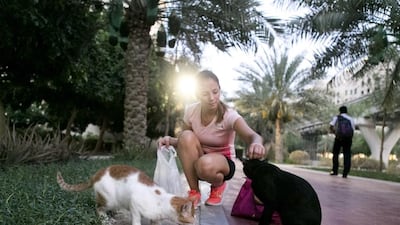It's great that you are highlighting the ongoing battle of ignorance towards animals with the article on animal abuse last week (Starving puppy with legs broken in fight for life at Dubai vet, February 3).
This country is getting swamped with unwanted cats and dogs, dumped and left to starve on the streets, or succumb to the fate of pest control or abusive humans.
There are many small independent groups of people who constantly try to help these helpless creatures by assisting and encouraging homing and trap, neuter, release, a proven and effective method of controlling the cat and dog population.
Countries such as Georgia and Portugal have controlled colonies. The UAE had this plan many years ago, but now the animals are simply “removed”.
I have personally taken 10 dumped cats and kittens in various condition from Khawaneej Park and have sterilised the remaining dumped pets, with my own money.
Someone “complained” and now every single cat has been taken to an unknown fate. Education is needed and tolerance for the creatures who share our planet.
Lorraine Ludman, Dubai
In reference to your editorial Big cats have no place in UAE villas (February 2), there are many "grey areas" regarding wild animals.
For example, what happens when one of these “pets” decides to expand its dietary requirements? Let’s say I was taking a walk and this “pet” decided to attack me? Who will be responsible? How will that matter be tackled by law?
At the most, there will be a reminder that it is illegal to keep a wild animal in a private house. It is indeed illegal, but no one cares.
The number of animal abuse and abandonment cases here is far too high. That’s because no one gets punished or prosecuted.
Animal welfare groups can only do their bit. The good residents often cannot do much for the animals as they face restrictions from building owners. The vet costs are also prohibitive.
Yet, many individuals as well as welfare groups spend a lot of their time and money to help abused and abandoned animals with no solution in sight. This is unacceptable.
Jean Francoise Ng Lewis, Dubai
Europe is not ‘post-Christian’
Sholto Byrnes's opinion article The pernicious influence of liberal interventionism (February 1) was interesting, but I have to dispute the writer's assertion that Europe is "largely post-Christian".
The Pew Research Center put the percentage of the European population that is Christian at 74 per cent in 2010, declining to 65 per cent by 2050.
There were 553 million people identifying themselves as Christian in Europe in 2010. A look at the figures for countries such as Poland, Italy, Ireland, Denmark, Norway, Greece and Croatia shows the vast majority (77 per cent to 94 per cent) to be Christian, whereas even the more secular and supposedly sophisticated United Kingdom, France and Germany range between 50 per cent and 67 per cent.
Regular church attendance is falling, granted, but does that alone make Europe “post-Christian”? I don’t think so.
Name withheld by request
Some issues with transport
Public transport can save both money and the environment. Unfortunately, those who prefer to travel by public transport face problems regarding timing and availability.
Passengers often have to wait for a long time to get a bus. Then, after 11pm there is no bus service in Abu Dhabi. At weekends, service is even fewer. This is why illegal shared taxis are always in demand. If this situation is going to remain the same, the authorities ought to allow people to share taxis.
MA Mannan, Abu Dhabi

